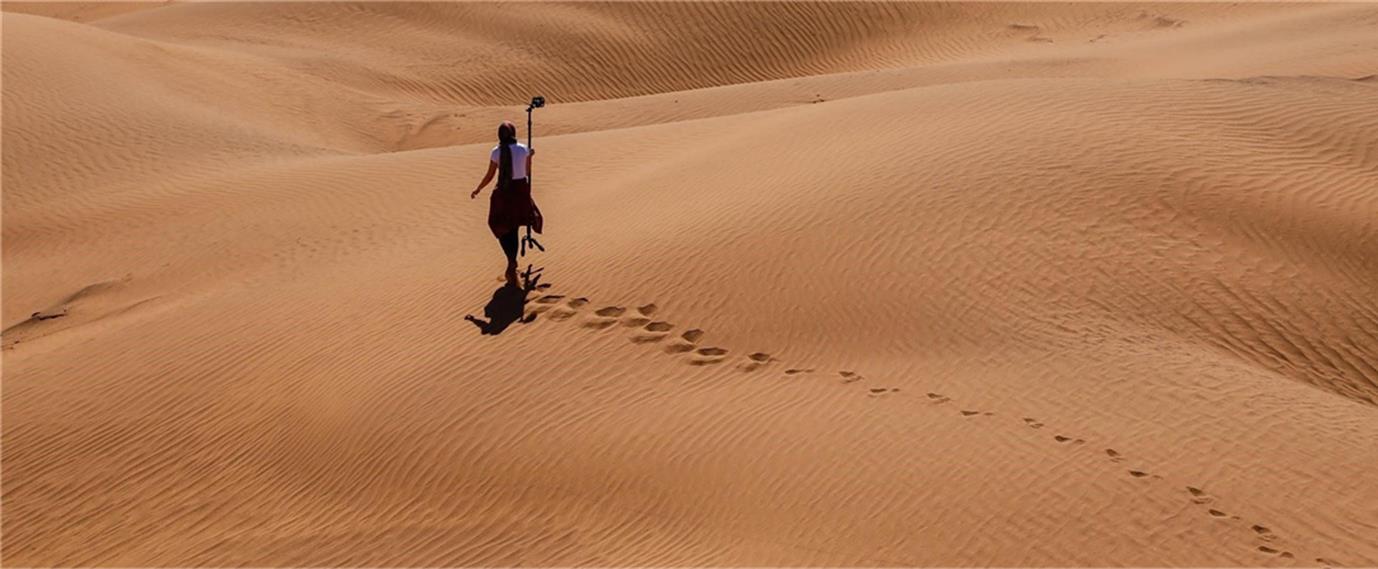يمكن لتقنية الواقع الافتراضي أن تكون وسيطًا مثاليًّا لتوثيق آثار تغير المناخ، مما يسمح للمشاهدين بالسفر إلى أماكن بعيدة ومشاهدة تأثير تغير المناخ بأحاسيسهم. تأخذنا مقاطع الفيديو المصورة بتقنية 360 درجة إلى دائرة القطب الشمالي تارة والصحارى المغربية تارة أخرى. ومع ذلك، فبينما تسمح لنا التكنولوجيا بالانتقال الافتراضي إلى مواقع مختلفة، يجب أن يكون تركيزنا الأساسي على المجتمعات المتأثرة بتغير المناخ كل يوم.
المصالح الإنسانية
غالباً ما نسمع عن تغيرات المناخ من خلال الإحصاءات والأرقام والدرجات؛ من حيث ارتفاع درجات الحرارة، وانخفاض أو ارتفاع مستوى مياه البحار، وأنماط الطقس المتغيرة. ومع ذلك، ليس من السهل فهم ما تعنيه هذه الأرقام فعليًا، خاصةً إذا لم نشهد أي تغييرات بشكل يومي.
"أعتقد أنها أكبر قضية في العالم، ويبدو أنها القصة والقضية التي فشلت الصحافة في تغطيتها. إن الصحافة تحب الأشياء التي حدثت بالأمس، والتي يمكن أن تصفها وتنسبها لسبب ما "
- آلان روسبريدجر ، رئيس تحرير سابق لصحيفة الغارديان، في مهرجان الصحافة الدولية في عام 2018
يعتبر تغيّر المناخ قضية مثيرة لاهتمام الكثيرين، وتكتسب الاهتمام عند وقوع كوارث يكون التغير المناخي المتسبب بها. يتحدث الصحفيون عن السبب والنتيجة، لكن الحقيقة أن تغير المناخ يؤثر على المجتمعات كل يوم. ومن خلال توثيق هذا الخطر وتسليط الضوء على القصص الشخصية، فإننا نقدم السياق الذي نحتاجه لشرح قضية تغير المناخ المعقدة والدقيقة للغاية.
في Contrast، نسعى دائمًا لشرح المشكلات المعقدة من خلال القصص الشخصية، وهذا ما فعلناه فيما يتعلق بقضية تغير المناخ. في "الواحات المختفية"، فيلمنا المصور بتقنية الواقع الافتراضي، نسلط الضوء على تأثير تغير المناخ في واحة المحاميد جنوب شرق المغرب، نتحدث إلى ثلاثة مواطنين عن حياتهم وآمالهم ومخاوفهم المستقبلية. وبينما يبين الفيلم كيف أثر تغير المناخ على حياتهم، فإنه يركز أيضًا على جهودهم لتحسين أوضاعهم. لا يرى المشاهد التغييرات الواضحة فحسب - كأشجار النخيل المغطاة بالرمل مثلاً- ولكنه يتعلم الكثير عن ومن السكان المحليين.
يقول جون رايلي ، المدير المشارك لبرنامج MIT المشترك، خلال خطابه في مهرجان الصحافة الدولية في بيروجيا بإيطاليا "أعتقد أننا بحاجة إلى إثارة المشاعر، على المستوى الشخصي والمحلي".
وفقا لرايلي، هذا مهم جداً وبشكل خاص في الحالة الراهنة، عندما تصبح الحقائق أقل أهمية. ويتابع قائلاً: "[مناشدة العواطف] تمثل تحدياً حقيقياً لأن عملنا يكمن بأن نقصي العواطف ونقدم حقائق موضوعية، وهذه هي الأشياء التي لا تتواصل".
التكنولوجيا لا تجعل الأمر أسهل
يُعد الواقع الافتراضي أداة فعالة لإظهار التغييرات في بيئة ما أثناء انغماس المشاهدين بالمواقع والمجتمعات التي ربما نادرًا ما يسافرون إليها. يقول جوناثان جراي، المحاضر في كلية كينغز في لندن، في مهرجان الصحافة الدولية: "هناك إمكانيات هائلة لصيغ بصرية وروائية في فهم هذه المسألة [تغير المناخ] وإيجاد طرق مختلفة لتجربتها". وفقًا لجراي، يشكل التقديم المرئي التفاعلي للبيانات طريقة أخرى لجذب المشاهدين إلى الموضوع بشكل أفضل وأكثر فاعلية.
ومع ذلك، في حين تمنحنا التكنولوجيا فرصًا أكثر إبداعًا وتبحث عن وسائل أكثر إثارة لإخبار القصص، فإنها لا تجعل عملنا كصحفيين أسهل بكثير. المهمة لا تزال ذاتها - تقديم تقارير دقيقة وأصلية مبنية على الحقائق، ولكن بطريقة جذابة ومثيرة للاهتمام.
من الصعب تغطية قضايا تغير المناخ؛ ففي Contrast، كان علينا العمل من خلال العديد من النسخ التجريبية لفيلم "الواحات المختفية" قبل أن نتفق على نسخة نهائية.
بعد كل عملية مونتاج، شعرنا وكأن شيئاً ما كان مفقوداً، وأننا بحاجة إلى أن نكون أكثر وضوحا أو أفضل شرحًا لما يحدث. خلال مرحلة ما قبل الإنتاج وما بعد الإنتاج، حافظنا على تواصل مع العلماء والمختصين الذين ساعدونا في مراجعة النص والحقائق والمصطلحات المحددة. كانت تجربة جديدة وثرية لكلا الجانبين.
كان على العلماء العمل على تثقيفنا حول هذه المسألة (إذ لسنا بخبراء في موضوع تغير المناخ)، وكان علينا أن نفهم ونتعلم "لغتهم" من أجل "ترجمتها" إلى شيء يسهل على الجمهور تلقيه والتفاعل معه.
على الرغم من أننا واجهنا التحديات المذكورة أعلاه أثناء تغطية موضوع تغير المناخ، إلا أن هذه قصة مهمة للغاية يجب معالجتها. يجب أن نستخدم جميع الأدوات المتاحة لنا للتحدث عنها. في Contrast، نستخدم التصوير بتقنية 360 درجة لإنتاج مادة واقع افتراضي VR، وهذا يتيح لنا تقديم تجربة شخصية وحميمية ذات صلة بموضوع كهذا.
ترجمة: إيليا غربية








































